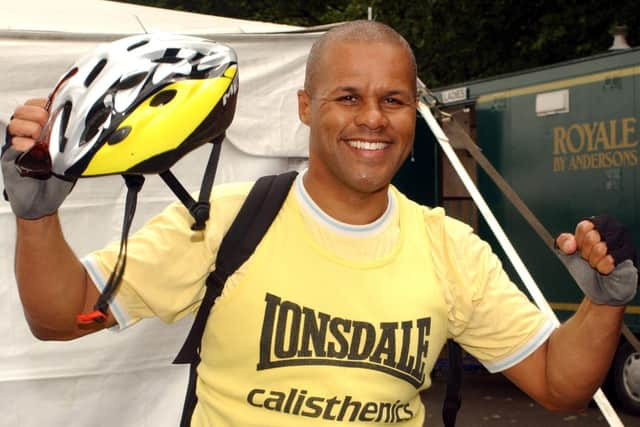Gary Wilmot on 40 years in showbusiness and why he can't wait to get back on stage


Today, Wilmot is 66 and a veteran of both the stage and the small screen. Despite his early success he maintains that his career has been a case of happenstance and “mainly being in the right place at the right time.”
His father, Harry, had been a professional singer and died when Gary was only six years old. “My mum was far more interested in putting food on the table, getting me off to school, and making sure that our home life in London was as good as it possibly could be. So, although Dad was a professional singer, I really wasn’t aware of what he did. The word ‘showbiz’ meant nothing to me,” says Wilmot.
Advertisement
Hide AdAdvertisement
Hide Ad“He was part of a group called the Southlanders and if they are remembered by a certain generation these days it’s because of one line, from one particular song – ‘I am a mole, and I live in a hole’. And if it ever pops up on the radio, that’s my dad singing it...”


Wilmot left school at 15 and worked his way through any number of jobs. “There were so many, I really can’t remember all of them,” he laughs.
“I was a carpenter, a warehouseman, a scaffolder – which to me was just soul-destroying – and a courier for a sporting goods firm, where I had to deliver trainers and Speedos and stuff all over London.
"Years afterwards, when I turned up at a big charity fund-raising event I bumped into the boss of the chain who took me to one side, and he told me – teasing me, of course – that if I’d stuck with him and his brand and kept my nose to the grindstone, I could well have been managing one of his stores by now instead of just starring in the theatre.”
Advertisement
Hide AdAdvertisement
Hide AdWilmot also spent time working as a waiter and barman in Benidorm. “I made a lot of very good mates. There was a lot of joking around and telling stories and, looking back, I think a lot of those lads could have made a career in comedy, but it was one of them who gave me the card of an agent that he’d met socially somewhere, and I plucked up the courage to make an appointment with this guy.
"I went to see him and he said ‘Show me your act, then’, to which I replied ‘Sorry, what’s an act?’ I can still hear the sound of his jaw hitting the floor to this day.”
However, he must have seen something in Wilmot because he was introduced to another agent, took acting lessons and was teamed up with Judy McPhee, and together they made it to the finals of New Faces.
“That was the start of it all, because back then that show was pulling in about 17 or 18 million viewers every week, about a third of the UK population, which was incredible by today’s figures.”
Advertisement
Hide AdAdvertisement
Hide AdAs well as this big break, he honed his skills the old-fashioned way. “I was performing at all sorts of venues and that teaches you a lot about what you can, and cannot, get away with on stage, particularly Northern and Yorkshire audiences. I loved them – because they were so honest and straightforward. They paid their money and they wanted entertaining and you had to respect that and deliver your best.”
Wilmot became a familiar face to TV viewers into the 80s, popping up on, or hosting, numerous prime time series like Copy Cats, The Keith Harris Show and So You Want to be Top? And then came a career-changing moment. “I’d been to see a musical in the West End called Me and My Girl, which was a huge success, and it was based on a pre-war show of the same name that had been adapted and revised by Stephen Fry.”
Wilmot went with some friends met some of the production team. “I did that unforgivable thing – I just gushed. I told everyone how wonderful it was when I’d seen it, how marvellous I thought everyone was and even where I’d been seated, in ‘row G for Gary’.
“I was a complete embarrassment but my complete gaucheness must have paid off, because someone later suggested that I went up for an audition, [to play the lead role, Bill Snibson] and, to my complete astonishment, I got it.”
Advertisement
Hide AdAdvertisement
Hide AdWhat he modestly doesn’t add is that he had his name in lights at the Adelphi Theatre on London’s Strand for another two years, and was nominated for an Olivier Award, followed by two subsequent UK sell-out tours.
It was a key moment for Wilmot and for black actors in general. “I’m rather proud of that”, he admits. “In my own small way, I was part of the move toward far greater cultural diversity in our business.”
Looking at the list of the roles he has played in the last few decades shows just how much has changed. He was Fagin in Oliver!, Dick Deadeye in HMS Pinafore and Billy Flynn in Chicago.
It’s meant he’s well placed to encourage those just starting out. “I’m constantly telling youngsters who ask for advice that they should be confident and believe in themselves. I say to them, ‘You can do it and if you want to do it that badly, you will do it. If you don’t get that audition, walk away and ask yourself why. Then make a vow to be better the next time round. Don’t start weeping, learn from the experience.’”
Advertisement
Hide AdAdvertisement
Hide AdAs with so many in the theatre – and elsewhere – the past year has been a tough one for Wilmot. He was starring in The Prince of Egypt in the West End when Covid closed all live performances across the country.
But entertainers are nothing if not inventive folk and he and his colleagues decided to revisit and record their barnstorming performances in Flowers for Mrs Harris, the multi-award-winning show which premiered at the Crucible in Sheffield in 2016 before a later revival at Chichester’s Festival Theatre.
“We actually took over the Chichester stage and socially distanced ourselves in line with all the rules. It’s big enough, and we had the full orchestra and the cast for a glorious reunion. It was also streamed to audiences across the country, so we hope that we cheered up a lot of people,” adds Wilmot.
He wants to get back on stage as soon as regulations allow. “Some of my very favourite venues are in Yorkshire. The Grand in Leeds, the Lyceum in Sheffield, and Bradford’s Alhambra and St George’s Hall. Spaces with history, proper theatres, and really special audiences.
“I’m an optimist. It will all resume, I know. But until then we all have to be patient.”
Flowers for Mrs Harris is available on CD and to download from SimG Records.
Comment Guidelines
National World encourages reader discussion on our stories. User feedback, insights and back-and-forth exchanges add a rich layer of context to reporting. Please review our Community Guidelines before commenting.